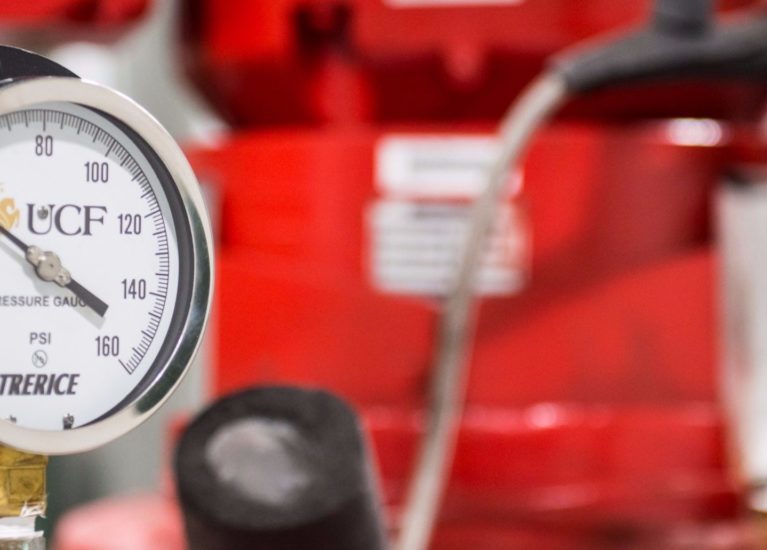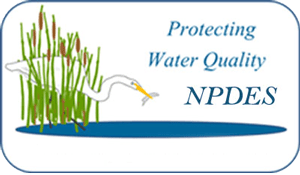
Stormwater
The University of Central Florida has a great watershed that encompass more than 10 artificial and natural pond systems. These water bodies are monitored and maintained regularly by staff, as well as student volunteers through the “Adopt-a-Pond” program, to preserve the health and quality of each pond.
Stormwater, as defined by St. Johns River Water Management District (SJRWMD), is rainwater that runs off of impervious surfaces into the nearest body of water, including natural lakes, wetlands, and man-made retention ponds. The management of stormwater is important for the health of both developed and undeveloped areas. In developed areas, streets and storm drains are part of the drainage system which protects from flooding. Proper management of stormwater also protects undeveloped, or natural areas, by regulating what is allowed down a storm drain.
According to epa.gov, the benefits of effective stormwater management are:
- Protection of wetlands and aquatic ecosystems
- Improved quality of receiving water bodies
- Conservation of water resources
- Protection of public health
- Flood control
Anything that finds its way into a storm drain will become a part of the local watershed, which is why we must be diligent as a community to keep pollution off of the ground. At UCF, we want to protect our watershed quality according to the UCF Master Plan and regulatory permits with SJRWMD.
Stormwater Permitting
What the permit is:
Created in 1972 by the Clean Water Act, the permit program addresses water pollution by regulating the discharge of stormwater into the water bodies of an area. UCF uses Best Management Practices (BMPs) to prevent/reduce pollution.
Why it is important:
In areas where rainwater can seep into the ground regulation is not necessary, but because of the impervious surfaces on campus such as roads, sidewalks, roofs, etc., UCF has to regulate how the water is discharged.
UCF’s NPDES PERMIT

Illicit Discharge Detection and Elimination System
What is an illicit discharge?
Generally, an illicit discharge is anything other than stormwater that makes its way into a storm drain. These discharges result in high levels of pollutants in the surrounding natural lakes, rivers, ponds, and streams. At UCF, this includes Lake Claire and Lake Lee. Pollutants that end up in these water bodies significantly degrade water quality and threaten aquatic, wildlife, and human health.
The most common sources of illicit discharges are:
- Sanitary wastewater
- Septic tank drainage
- Car wash wastewater
- Detergents in pressure washers or window washing
- Improper oil disposal
- Paint or concrete washout
- Radiator flushing disposal
- Spills from roadway accidents
- Improper disposal of auto and household toxics
ILLICIT DISCHARGE REPORTING FORM
Construction Site Compliance
Why do stormwater discharges from construction sites matter?
When it rains, stormwater washes over the loose soil on a construction site, along with other materials being stored outside. This stormwater picks up pollutants from that loose soil and transports them to storm drains on campus. At UCF, these storm drains lead to ponds, lakes, and rivers on and around campus.
The most common pollutants from construction site runoff are:
- Sediment
- Solid and sanitary waste
- Phosphorous (fertilizer)
- Nitrogen (fertilizer)
- Pesticides
- Oil and grease
- Concrete truck washout
- Construction chemicals
- Construction debris
The pollutants that are carried off construction sites can affect the physical, chemical, and biological health of those water bodies that receive stormwater. UCF works with the construction site operators on campus to ensure the proper stormwater controls are in place. These controls allow for the protection of natural lands on and off campus.
If you see cloudy water running into a storm drain, or paint being dumped down a drain, or anything else of concern, you can report it here.
CONSTRUCTION VIOLATION REPORTING FORM
Adopt-a-Program
The adopt-a-program allows for campus groups and organizations to participate in the preservation of UCF’s natural lands. The program includes the adoption and bi-weekly clean-up of ponds and roads on campus. Once adopted, it is the organization’s responsibility to ensure the pond/road is kept free of litter. For more information on the adoption process, or which roads and ponds are eligible, visit the arboretum website.
UCF holds and participates in many different outreach efforts to make its community aware of the importance of clean stormwater. This includes stormwater tours, tabling events, community clean-ups, and the distribution of educational materials to students, employees, and businesses on campus.



